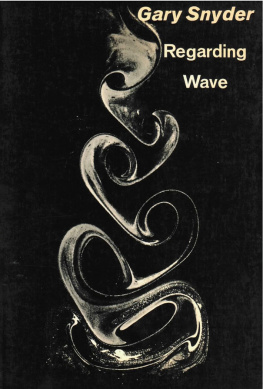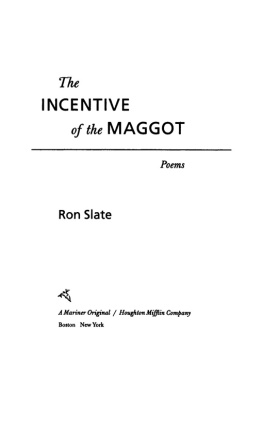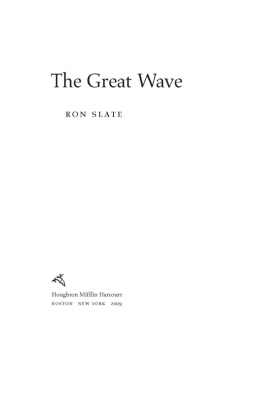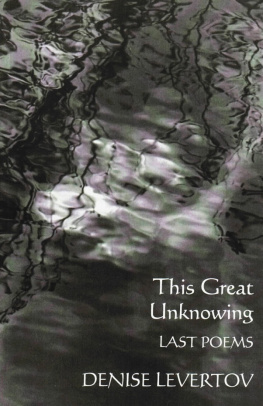
Table of Contents
Copyright 2009 by Ron Slate
ALL RIGHTS RESERVED
For information about permission to reproduce selections from this book, write to Permissions, Houghton Mifflin Harcourt Publishing Company, 215 Park Avenue South, New York, New York 10003.
www.hmhbooks.com
Library of Congress Cataloging-in-Publication Data
Slate, Ron.
The great wave / Ron Slate.
p. cm.
ISBN 978-0-547-23274-4
I. Title.
PS 3619.1.365 G 73 2009
811'.6dc22 2008037385
Book design by Melissa Lotfy
Text is set in Aldus
Printed in the United States of America
MP 10 9 8 7 6 5 4 3 2 1
for Nancy
and for all who remember
Carey and Charles Tenen
The feeling that if the slightest crack opened up in this enclosed vision, all things could spill out beyond the four points of the horizon, leaving you naked and alone, begging alms, muttering imprecise words, without this amazing preciseness you had seen.
George Seferis, journal, October 21, 1946
To the One Who Hears Me
In the fifth year of friendship
he asked permission to tell his secret,
suggesting we go to a donut shop nearby.
Grand theft, drug dealing, a year on Rikers Island.
Now I have hustled you to this other spot
without even a cup of coffee to offer
nor for that matter to take you
into my confidence.
The great felons exceed the petty thieves
in intuition, the greatness unmeasured
by the size or value of what is removed,
but rather in the shuffle and the shift.
The shock was not in the details,
the carjacking of a famous quarterback's convertible,
"actually his wife's," but my realizing
he recognized the level of my listening.
This intimacyall to help him appear to grasp
the vexing source of manic energy
agitating everyone on the job.
In the telling, he in his suit became a white man
selling crack out of a red Saab
with the top down three blocks north
of MLK Boulevard. His former roommate, the quarterback,
helped spring him early with a personal appeal.
He was saying: Make use of me,
all my skills are now at your disposal,
trust my boldness, and when you discover the way
into your fortune, take me with you.
We sat in the shadow of our office tower
and he knew whom he was talking to.
Just as I am speaking to you now,
not exactly waiting for your reply.
I
Meditation by the Sea
Engines, the slitting hiss of tires on asphalt,
doors opening and slamming, footsteps on stone,
then on carpeting. Keystrokes, devices beeping.
For years these bland sounds saved me.
Welcome, they said, to our confines.
But don't think the times were uneventful.
In fact, they seemed supernal,
as when people first figured out the gods
caused the world to cohere but could perform
nothing miraculous. The coherence amazed.
Other sounds thenat the beach, my children
invented names for the rocks in the surf.
America was closest to shore, then Haystack.
Farthest out, Neptune, often invisible.
Sometimes my ear would catch the cry
of a mud swallow, or the motor of a plane
tugging a sign, or the puncture of a beer can.
But it was as if these sounds were enclosed
elsewhere, like the ear ringing, heard then forgotten.
My daughters' mouths moved soundlessly, on Haystack.
Did I begin too receptive to the world's sounds,
needing closureor sealed from the messages,
in need of piercing? Should I try to hear
above the roar, or speak to it,
or against it?
Watch This Space
Whatever appears wants to attach emotionally.
Nothing appears.
All that might be but is not.
When there's no demand, all eyes come to me
there's room for everyone.
A voice resistant to its own proposals.
And a row of pigeons facing sunset.
My beloved exists in a backward time.
Which of us is the screen the night air flows through
as we lie there not speaking?
Still an excess.
So much work to make it useful.
I've said nothingand already, my late period.
But deep in this white space is the real thing.
Come to me, I'm yours, since you regard me
with such pure blank love.
At the Swedish Embassy
A mature linden in bloom,
humid June evening in D.C.
Swedish entrepreneurs came closer
to say their names on the terrace,
among peonies, spent irises,
and dahlias making their move.
Platters of gravlax and herring,
the air abuzz with "verbal agreements"
together we will engineer impatiens
able to survive a hard frost,
now that the steep helix of the northern hemisphere
has been scaled, the code manifest,
their vodka on our ice.
The Swedes say the world started like this:
an abyss, to the north a cold world,
to the south a kingdom of torches.
Frosty mist rose from a frigid well,
a frozen stream to fill the void,
then southern flares fell into the ice,
and droplets changed into beings.
Runic script on the rusted leaves
of the hollyhock. A napkin on the lawn.
The ambassador's wife confided:
"I would much rather talk
with one person. Do you know
the poetry of Transtrmer?
Every person is a half-open door
leading to a room for everyone.
Apparently that room is in my house,
since we endlessly entertain."
But absent of us, her garden
would have merely drifted into dusk,
no longer pleasing and admired.
We stood there in that simple darkness.
Was this why I sensed the brief lives
of bedding plants as if for the first time?
No, because it was the first time.
Must my approach be so clever, so facile?
Answer that one yourself.
In the dimmest light, the linden's scent
turned oppressive. It was time to design
a way to outlive all urgencies.
Thus I conceived a brilliant marigold
to last an eternal age of ice.
Ici Mort Robert Desnos
In the anthology of elegies, every voice moans:
I am not yet a dark shape, my mourning
is not maudlin, and I feel the full weight
of the casket and its content of memory.
When the bus arrived at the Little Fortress,
there were yellow streaks in the air.
A cold noon in April, the dim voice
of a German tour guide spoke of Robert Desnos,
who was one of those sallow flashes.
My wife found the plaque marking his death,
in the barracks, and came to find me
alone on the bus dreaming in a viral fever
my dead cousin Charles and I
planning our trip to La Creuse,
the town Sardent and the village Villevgoux,
where our family waited for the war
to recede to the Rhine, the road clear to Paris.
But now I'll never see those places.
They're trying to live again at Terezn,
a bakery, a grocery among shadows.
A cautious girl running home
with bread. When my wife found me,
she looked as if we'd been deprived
of all those years together.
Now I'll never go to La Creuse,
tracing the escape from Paris,
Charles and I laughing at folly in a rented Renault.
When my grandfather found him and my uncle Marcel
with their bathtub overflowing in a hotel
above the rooms of the German command,
he slapped them for stupidity.
They say Desnos read the jaundiced palms
of fellow detainees and found good fortune.
This is the air we inherit, moist with delirium,
the faintest smell of something baked.
The dead ones say: Never-to-Return,
you are a dark shape
among flaring arcs, your grieving matters less
Next page











